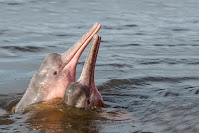Wednesday, January 17, 2024
Nine Countries Sign Pact to Protect River Dolphins
One hundred fifty-four river dolphins,Inia geoffrensis ,died in the Amazon's Lake Tefé this last summer duirng an intense drought. Lake water was significantly reduced and what remained reached 40℃, well above their tolerance level. The deaths spurred conservationists into action to protect the decline number of six species of river dolphins. A few days after reports of the deaths reached officials, they met in Bogata, Columbia to consider action. Fourteen range nations were encouraged to sign the Global Declaration for River Dolphins, advanced by Colombia and conservation NGOs. So far nine countries have signed with China, Myanmar and Indonesia expected to also sign.
The declaration commits signatories to implement specific actions to save the acquatic mammal , such as collaborating with local communities, eliminating unsustainable fishing, conducting more research and establishing a network of well-protect riverine environments. WWF told the conference members that climate change is not only affecting river dolphins, but humans too. Many rivers have become impassable at low water, further isolating native communities that depend on rivers for transport, coummunication and sustanence. A state of emergency has been declared in 55 of 62 municipalities in Amazonas State alone. Dolphins are keystone members of an ecosystem since the indicate the health of the ecosystem they inhabit. Since the 1980's river dolphin populations have dropped by 73%. The seventh species of dolphin, the baji (Lipotes vexillifer), which inhabited China's Yangtze River, was declared extinct in 2007.
Efforts around the world to save river dolphins has seen some success. The population of finless porpoise in the Yangtze has increased by 23% according to the latest survey, but only 1,249 remain extant. In Pakistan and India, the Indus River Dolphin population has almost doubled in the past 20 years, but only about 2,000 remain in the wild. Indonesia has deployed signaling devices to prevent dolphins from drowning in fishing nets, while increasing catches for local communities. The signing of the international declaration is a positive step forward to saving these important species. [photo credits: WWF]


